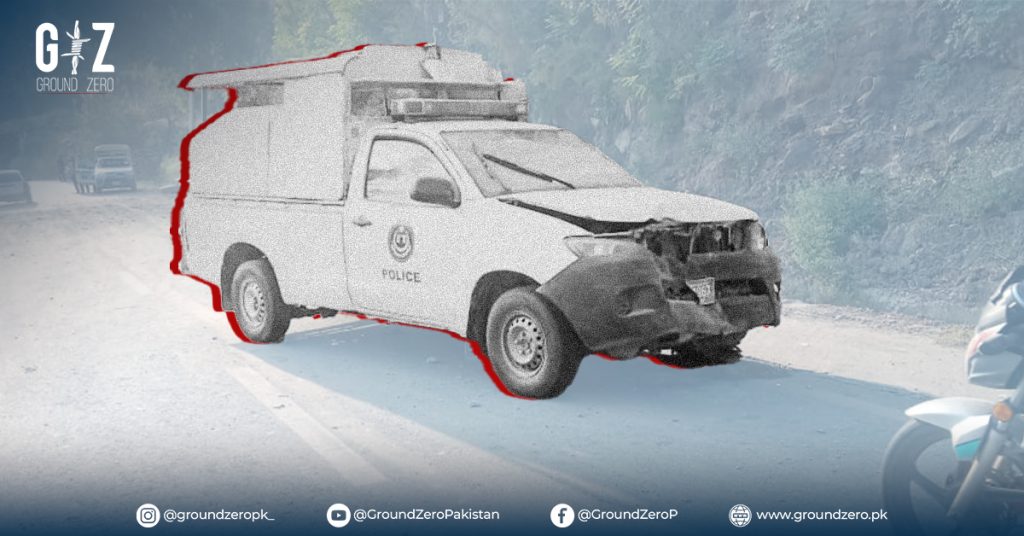Swat IED Blast Targets Police Convoy Escorting Diplomats
SWAT – An improvised explosive device (IED) blast struck a police mobile on Jahanabad Road, Malam Jabba, on Sunday. The attack, which targeted a police convoy escorting diplomats from 12 countries, resulted in the martyrdom of one policeman and injuries to three others. Fortunately, the diplomats remained unharmed and were safely returned to Islamabad, as confirmed by the Foreign Office.
The convoy, which included representatives from countries such as Indonesia, Portugal, Kazakhstan, Iran, and Russia, was in the region at the invitation of a local chamber of commerce.
Immediate Aftermath of the Attack
Constable Burhan was martyred in the blast, while Sub-Inspector Sar Zameen, Constable Amanullah, and Constable Habib Gul sustained injuries. Following the attack, the area was quickly cordoned off, and a search operation was initiated by the district police.
No group has claimed responsibility for the attack so far. Swat Deputy Inspector General (DIG) Muhammad Ali Khan confirmed that investigations are ongoing, while District Police Officer (DPO) indicated that the mobile van was completely destroyed in the explosion. The injured officers were rushed to District Headquarters Hospital.
For more details on the incident, visit Ground Zero’s Local News.
What This Means for Regional Security
While this incident specifically targeted law enforcement, the presence of foreign diplomats raises significant concerns about regional security in Khyber Pakhtunkhwa (KP). The attack not only disrupts the peace in Swat, a region once heavily impacted by militancy, but also has broader implications for the province’s security and its reputation.
The escalation of attacks in KP, particularly following the breakdown of the Tehreek-i-Taliban Pakistan (TTP) ceasefire, poses a threat to the safety of both civilians and law enforcement. The increasing frequency of these assaults—such as the Banr police station attack last month—underscores the fragility of security in the region.
With foreign diplomats in the convoy, the stakes were even higher. Any future attacks on international delegations could lead to diplomatic tensions and isolate KP from vital international partnerships. Additionally, such attacks can deter investment and tourism, both of which are critical for the economic revival of the region.
Broader Implications for Security in KP and Pakistan
The Foreign Office spokesperson, Mumtaz Zahra Baloch, reaffirmed Pakistan’s commitment to fighting terrorism, stating, “We honour our law enforcement authorities that remain steadfast in the face of terrorists.” Despite such assurances, this incident is a reminder of the ongoing militant threats facing KP.
Both President Asif Ali Zardari and Prime Minister Shehbaz Sharif condemned the attack, highlighting the increasing danger posed by terrorists. While government leaders have consistently reaffirmed their commitment to eradicating militancy, the frequency of these attacks suggests that a more robust security framework may be needed to prevent future incidents.
The Governor of Khyber Pakhtunkhwa, Faisal Karim Kundi, criticized the provincial government’s efforts to maintain peace, implying that the failure to establish security has emboldened terrorist elements. This sentiment echoes the concerns of local communities, who are demanding stronger measures to combat growing violence.
Key Takeaways:
•A tragic IED blast in Swat targeted a police convoy escorting diplomats, leaving one policeman martyred and three others injured.
•The attack raises broader concerns about regional security in Khyber Pakhtunkhwa, particularly given the presence of foreign diplomats.
•The ongoing surge in militant attacks highlights the fragile security situation in the region, especially after the collapse of the TTP ceasefire.
For more updates on the security situation in KP, visit Ground Zero’s homepage.


